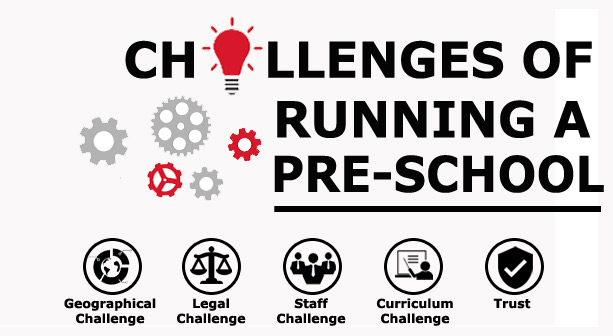Challenges of Running a Play School in India
India is still a relatively young place in terms of its play schools. The concept of play schools as an institute run by professionals is not very old. By “institute run by professionals”, we mean that play schools have mostly been thought of as neighborhood schools run by mostly housewives, in a casual manner. Since, no legal requirements are to be fulfilled in order to open a play school in India, such neighborhood schools become an easy option to make money. However, there are obvious limitations that these schools suffer from. As a result, parents have realized to move away from these schools to the more professional institutes that provide meaningful early education.
Running these schools is no easy task. The reason for the shift to these schools is there quality of education and the professionals that are employed as teachers. So, it becomes crucial to maintain these standards in running these schools. This article focuses on highlighting these and many other challenges that are faced in running a play school. It becomes extremely important to overcome these challenges in order to continue running these schools.
Legal challenges
Legal challenges in India are the biggest if one wants to run anything. Fortunately, this is not the case with running a play school. For whatever reasons, the law does not require obtaining any licenses to run a play school in India. However, that does not mean there are absolutely no legal challenges at all. Depending on the state in which the play school in being run or set up, there might be laws that are required to be complied with. Obtaining licenses & permits thus becomes compulsory for running play schools in these states. Also, the law requires that the labor law rules be followed. If the school employs more than 40 (according to the revised labor laws) employees, it is required to comply with various labor laws. These include following the minimum wage rule, providing for provident fund payments, etc. It is also compulsory to pay bonusses during festival times, and one-month bonus salaries etc. Thus, one needs to keep all this in mind.
Professional Employees
As mentioned in the beginning itself, having professional employees in every department becomes very crucial, especially professional teachers. It is listed as one of the challenges because the number of truly professional teachers available in India for toddlers is very limited. It is a field that has not been taken that seriously. Often it is the housewives, or mothers that end up performing these tasks. Even though they are careful & patient with the kids, it is not always the case that they know how to deal with the kids. Play schools have an agenda of nurturing young minds; this is not always necessarily achieved by non-professionals. Hence, having a professional employee base is a challenge that all play schools must overcome.
Curriculum and Teaching Pedagogy
Curriculum and teaching pedagogy is a crucial element in running a play school. The question that is frequently asked is what to teach to such small kids. Although, the govt. provides some basic requirements that need to be incorporated in the curriculum, the schools can also include elements on their own. Thus, to include things that make for a quality education becomes imperative for a good school. There is a lack of good curriculum being designed in India. This needs to be changed.
What also forms part of a good curriculum is an advanced style of teaching. Teaching pedagogy being followed in India is still old & outdated. Teachers mechanically teaching a bunch of students in a classroom. This needs to be modified to attract a young toddler’s mind. What is required is more & better use of technology, forming personal bonds with students, healthy student-teacher ratio, and a lot more. This needs to come from the private sector employing professional & trained minds.
Overcoming Geographical challenges
As it turns out, in India geography also poses a major challenge in operation of play schools. Some of the most remote areas of the country are where a very substantial portion of kids live. To be able to reach out to these kids in these remote areas is a task that play schools must overcome. The main aim of play schools or schools in general is to enable children to lead a good life. If we leave out a major chunk of children from this exercise, then we can never claim to have achieved our goal.
Geography also becomes a challenge in ensuring minimum infrastructure. There is still no electricity is most of these regions. Thus, it becomes difficult to provide basic infrastructure to kids in schools.
Forming a trust bond
Probably the biggest challenge for any play school is to form a trust bond. This is a task that requires years of hard work and reaching out. Whether a play school manages to survive or not solely dependent upon the trust it manages to gain from the parents. If parents do not trust the brand name of the school enough to send their children to the school, then such a school has no value to it. Working towards ensuring this trust & maintaining it with the community is a never-ending process. Good teachers, efficient and kind administration goes a long way in building this trust.
There are many more challenges that are faced in running a play school. The above list or any other such list cannot be exhaustive. It gives us a basic idea of the broad challenges that are faced- technical & social- but it does not reflect the sundry challenges that are faced in day to day running a play school. Above all of this, the biggest challenge is the challenge of responsibility. Play school is more than just a business; it a serious commitment made to the society. These young children go on to define an entire generation, and every society is deeply invested in ensuring their well-being. Play schools need to reflect this commitment even more seriously.




